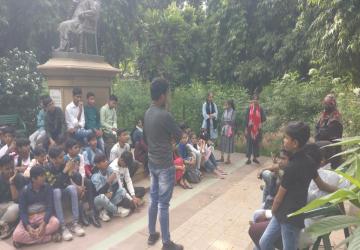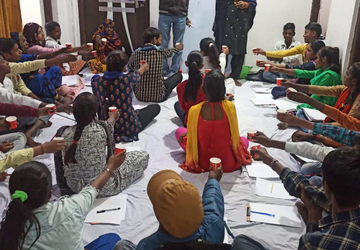Urja Ghar
Urja Ghar – the energy of creativity, criticality and commitment:
Urja Ghar (Home of Energy) is a group of young people based in the rural parts of Sabarkantha and Banaskantha districts of North Gujarat and urban parts of Ahmedabad city. Held together purely by a commitment to peace, social justice and active citizenship through critical thinking, these young people have sustained their work in 55 villages of Sabarkantha and Banaskantha district of Gujarat and Udaipur district of Rajasthan for over eleven years now. Post the Gujarat carnage in 2002, community culture in the state was characterized by fear, apprehension, hatred and revenge. It is in this context that Urja Ghar was formed through a project turned into an organization owned by the community, by young people committed to using reason, dialogue and creative expression to build a culture of peace.
Urja Ghar works with adolescents, youth and community uses creative mediums to question the given, the unjust, the violent and builds groups of children and youth who infuse the village and its neighboring areas with the energy of reconstruction. Unlike many, it works both with the marginalized and the dominant sections of society. With the former, it strives to create a platform to promote a culture of dialogue in the place of culture of silence; with the latter it works to build sensitivity and empathy.
The mobilization of the community to empower for sustainable development is the major thrust area of the organization using various methods such as story-telling, watching and critiquing popular films, documentaries and songs, creative writing, music, theatre and games are the pegs it uses to learn and teach. The walls of the village are the writing board and magazine; the bazaar, the streets, the tea-stalls and the inner recess of homes its class rooms. Gender, caste, religion, violence, peace, reason – nothing is too sacrosanct for debate and critical analysis.
The Journey of Urja Ghar
The potential of an initiative that is focused on creativity, criticality and mobilization is apparent in the journey of Urja Ghar. During the phase of 2004 – 2007, it was focused largely on creating an environment that enabled dialogue and discussion and that challenged stereotypes pertaining to religion, gender and caste. As a result bridges were built in communities, children interacted with each other, women stood together in cases of domestic violence and fears of the ‘other’ were mitigated by the sheer experience of the being human of each person.
In the 2007 – 2010 phase, once the organization was registered as an independent society/trust, the work was shifted according to the need of the people in the villages, and issues pertaining to Right to Work, Right to Food, Health and Right to Education in the 16 villages of Sabarkantha rose to centre stage. During this time sathidars (Urja Ghar Volunteers and workers) worked tirelessly across the districts mobilizing people so that they could avail of the minimum wages under the NREGA; various health services that accrued to women, young girls and children under the age of six as per the ICDS; and insist on minimum requirements in the schools in the area. Urja Ghar took up the issues decided by the community collectively to work upon and went forward. At that time the focal point of the activities surrounding the issues related to Right to Work (MNREGA), Right to Education and Right to Health and the approach was absolutely right based.
After 2010, the work continued on the issues of School Governance including the empowerment of the SMCs and to make the primary education is the combined responsibilities of the community and the school together. The active involvement of the Panchayati Raj Institution and active and equal participation of the women and the youth was at the core of the work. The empowerment of the Rule of Law Committees in the villages for the dialogue with the concerned department for the civic rights remained the very effective in fulfilment of the basic citizen rights of roads, water and employment. The Youth Development programme evolved in to the employability opportunities through skill training as well as the support in various competitive exams by the Youth Resource Centre owned by the youth. Youth Resource Centre is very active in engaging the youth and the adolescent in the constitutional literacy through a game called Samvidhan Live in which the youth leart the constitutional values through a game in a very funful way and live the Indian Constitution relating it to everyday activities through experiencing with various tasks related to the fundamental rights and fundamental duties. The tasks were themselves the action by the youth as active citizens which led the youth as young changemakers. Urja Ghar has collaborated with the Magic Bus Foundation to take the program of Sports for Development covering the issues of Child Rights especially Right to Participation, Education and Health and Active Citizenship through the sports of football.
Now, Urja Ghar has expanded its work in to the urban part of Ahmedabad city. It is working with the adolescent in the schools on the issues of Constitutional Literacy and Sports for Development. In the collaboration with the Niti Ayog, Urja Ghar is working with the adolescents in the 13 schools in the various parts of Ahmedabad city on the issues of Child Rights, awareness regarding the SDGs and Constitution Literacy under its Youth Development through Active Citizenship Programmme.









